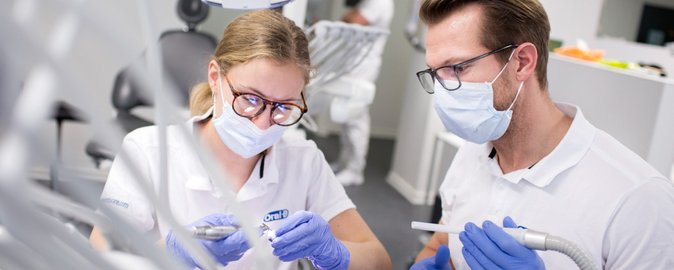- Education
-
Research
Current research
Talent
-
Collaboration
Businesses
Government agencies and institutions
Alumni
-
About AU
Organisation
Job at AU
Last week, the government proposed establishing a new dentistry degree programme in Hjørring in North Jutland. Department Head Siri Beier Jensen finds the decision puzzling and worries about the quality of the dental degree programmes, but not the graduates' mobility.
2021.06.03 |

The Danish Government's proposal for a third dentistry degree programme in Hjørring is a surprise to the head of department at IOOS. Photo: Lars Kruse
One part of the government’s education proposal on 27 May came as something of a surprise for Department Head Siri Beier Jensen, with its proposal for a new and third dentistry degree programme in Denmark. More precisely in Hjørring. The proposal was a single item mentioned once in a single sentence. There were no additional details and no warning or prior involvement of the academic environments.
"I'm quite pleased to see political focus on the dental field. That’s something we’ve lacked for a long time, but academically, I'm concerned about the government's proposal for a third dentistry degree programme in northern Jutland. The proposal seems ill-considered and impractical, almost arbitrary," says Department Head Siri Beier Jensen from the Department of Dentistry and Oral Health, which is home to the dentistry degree programme at Aarhus University.
One area of concern, although not the only one, is how it will be possible to ensure there is a health science academic environment in Hjørring.
"The dental degree programme is a research-based university education. It requires a strong academic environment, specialised researchers and teaching staff and close interaction with many of the medical disciplines to train dentists to a world-class level, as we do in Denmark," says Siri Beier Jensen and elaborates:
"The specialist odontological areas are relatively small subject areas. In Denmark, we have around sixty academic staff on the two dentistry degree programmes to cover all of the odontological disciplines, and it will be difficult for a third degree programme to recruit qualified researchers and teaching staff and ensure there is a research-based education, without further eroding the fragile research environment which the two current degree programmes already have," she says.
The Government's new education proposal "A step closer – More study programmes and strong local communities" has the objective of moving more study programmes out of the major cities. It also intends to help ensure that graduates remain in the provinces and find work there after graduation. According to Siri Beier Jensen, this is not a problem for dentists.
"The dentists who graduate from the University of Copenhagen and Aarhus University find jobs all over the country. They don’t just remain in Aarhus and Copenhagen as you might fear. In fact, we can see that the graduates are more spread out around the country two years after they complete their education, than they were six months before they started studying," says Siri Beier Jensen with reference to statistics on graduate mobility which Aarhus University's education secretariat has drawn-up.
"Our dentists also settle in north Jutland, so although the idea of decentralisation and creating growth in Denmark as a whole is understandable, it doesn’t make sense to establish a third dental degree programme. It’s the overall lack of dentists that makes it difficult to fill vacancies in Denmark."
According to Siri Beier Jensen, running a dentistry degree programme is an expensive business. The degree programme follows the operation of a hospital, which the department head calls 'a necessary teaching tool'. In Aarhus, the dental degree programme has approximately 35,000 patient visits a year, and the large number of treatments is necessary to provide the students with the necessary clinical training.
The cost of the running the clinic is borne by the dental degree programmes themselves, as opposed to the medical degree programmes, where the clinical teaching is primarily carried out in the regions. Both dental programmes therefore have a structural deficit of millions of Danish kroner every year.
"We’re underfunded and have already cut back as far as possible, both in terms of research positions and running the clinic. We’ve looked at every possible cost-cutting opportunity and worked really hard to make things work financially, so that we can continue to train talented dentists," says Siri Beier Jensen and continues:
"It’s really puzzling for us to see that there is suddenly a political initiative to finance a third dentistry degree programme costing many, many millions of kroner, when there hasn’t previously been the political will to ensure a sustainable economy and to cover the actual costs of running the clinical training. If the proposal is approved, it could potentially weaken the dental degree programmes and expose us to even greater financial pressure. We already have the set-up in place to train the necessary number of dentists for Danish society as a whole – and what is more, to do this for a significantly smaller financial investment."
Department Head Siri Beier Jensen
Aarhus University, Department of Dentistry and Oral Health
Mobile: (+45) 9350 8525
Email: siri@dent.au.dk